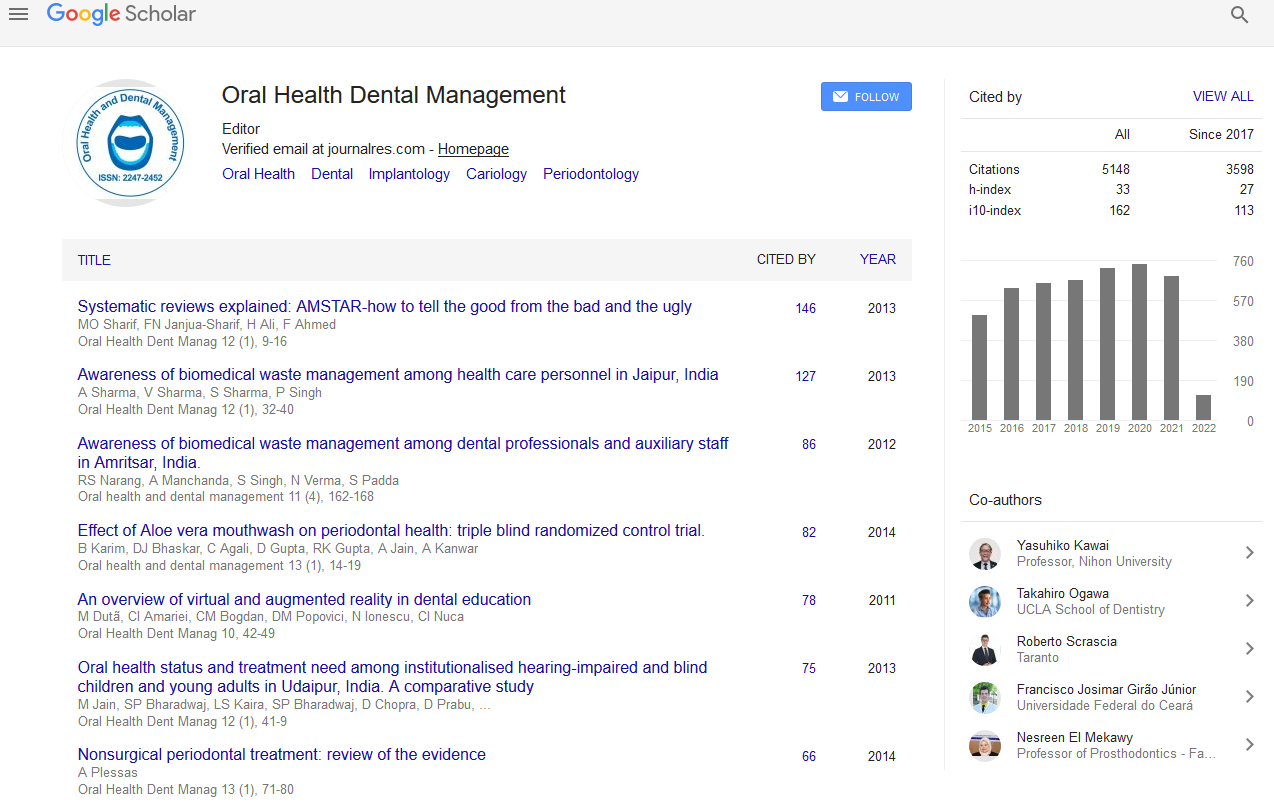Indexed In
- The Global Impact Factor (GIF)
- CiteFactor
- Electronic Journals Library
- RefSeek
- Hamdard University
- EBSCO A-Z
- Virtual Library of Biology (vifabio)
- International committee of medical journals editors (ICMJE)
- Google Scholar
Useful Links
Share This Page
Journal Flyer

Open Access Journals
- Agri and Aquaculture
- Biochemistry
- Bioinformatics & Systems Biology
- Business & Management
- Chemistry
- Clinical Sciences
- Engineering
- Food & Nutrition
- General Science
- Genetics & Molecular Biology
- Immunology & Microbiology
- Medical Sciences
- Neuroscience & Psychology
- Nursing & Health Care
- Pharmaceutical Sciences
Relative and attributable risk of unmet dental scaling on tooth loss among middle and old aged persons: A 3-year follow-up cohort study
4th Asia Pacific Congress & Expo on Dental and Oral Health
July 27-29, 2015 Brisbane, Australia
Ga-yeong Lee, Sang-baek Kho, Chun-bae Kim, Won-gyun Chung and Nam-hee Kim
Posters-Accepted Abstracts: Oral Health Dent Manag
Abstract:
Tooth loss promotes deterioration of physical and cognitive function promotes illness, and decreases the quality of life. Numerous studies identified risk factor of tooth loss. There were a lot of studies that identified causation between tooth loss and socio-demography, general health status, life style. However, there were only cross-sectional studies that identified association between oral health behaviors and tooth loss. Therefore, the objective of this study was to examine the relative and attributable risk of unmet dental scaling on tooth loss. We used data from the Korean Genome and Epidemiology Study on Atherosclerosis Risk of Rural areas in the Korean General Population. Subjects aged 40-75 years were invited to participate in the 3-year follow-up survey from 2010 to 2014. The final sample size for the present analysis was 559 participants (222 men and 337 women). A multivariate logistic regression was performed to identify risk factor for tooth loss using SPSS 20.0 for Windows. 265 (48.4%) experienced tooth loss during the 3-year follow-up period, and the mean number of lost teeth 1.56�0.11 teeth. As result of logistic regression analysis, age, education level and experienced scaling was significant. The incidence of tooth loss was 2.04 (1.119-3.702) higher in participants who consistently did not undergo scaling than in participants who consistently did. The relative risk for tooth loss was 1.86 in the participants who did not receive regular scaling. The attributable risk was indicated that tooth loss could be prevented in approximately 25 of 100 participants receiving regular scaling. This study showed that the incidence of tooth loss increased with fewer scaling procedures and encouraged oral health behaviors in middle-aged individuals in order to prevent tooth loss during old age.
Biography :
Ga Young Lee, student from Yonsei University in South Korea.

